Understanding the Different Sorts Of Moisture Meters and Their Applications
Understanding the Different Sorts Of Moisture Meters and Their Applications
Blog Article
The Ultimate Guide to Dampness Meters: A Comprehensive Review and Just How They Can Save You Money
In the world of structure upkeep, construction, and numerous markets, the significance of precisely gauging dampness degrees can not be overstated. Wetness meters function as indispensable devices in finding and checking moisture web content in products, aiding in protecting against expensive damages and ensuring the high quality of items. Understanding the subtleties of different kinds of wetness meters, their applications, and the potential cost-saving benefits they use can be a game-changer for services and specialists alike. Discovering exactly how these tools can not just streamline procedures but additionally contribute to monetary cost savings is a journey worth starting.
Sorts Of Wetness Meters
One common kind is the pin-type wetness meter, which determines the electrical resistance between 2 pins placed right into a material. Pinless moisture meters, on the various other hand, use electromagnetic sensor plates to check a larger location without creating damages to the material's surface.

In addition, there are likewise specialty wetness meters designed for specific materials like hay, dirt, or grain. These meters provide exact moisture analyses customized to the one-of-a-kind properties of the material being checked. Infrared dampness meters gauge the thermal buildings of a material to establish its dampness material non-invasively, making them useful for applications where pin or pinless meters may not appropriate. Understanding the different kinds of moisture meters offered can assist sectors select the most suitable tool for their particular moisture dimension requirements.

Benefits of Utilizing Moisture Meters
Moisture meters offer important benefits in precisely keeping an eye on and analyzing dampness degrees in diverse products and atmospheres. One of the key benefits of making use of wetness meters is the avoidance of possible damage created by excess wetness.
Additionally, using moisture meters can lead to enhanced energy efficiency. In agricultural setups, dampness meters play a vital function in enhancing plant returns by allowing farmers to keep track of dirt moisture degrees and make notified watering decisions.
Just How to Select the Right Wetness Meter
Picking the appropriate dampness meter involves thinking about key elements such as material compatibility, measurement range, and calibration accuracy. When choosing a wetness meter, it's important to make sure that the meter is appropriate for the particular product you will be testing. Different materials have differing electrical residential or commercial properties that can influence moisture readings, so choosing a meter made for your material is vital for precise outcomes. Furthermore, consider the measurement variety of the view it now moisture meter. Make certain that the meter can discover dampness degrees within the range needed for your applications. Calibration precision is another vital factor to remember. Go with a dampness meter with trustworthy calibration to make sure accurate and consistent readings. Some meters might need routine calibration modifications, so understanding the calibration procedure is important. By meticulously assessing these factors, you can choose a moisture meter that satisfies your needs and supplies exact wetness dimensions for your tasks.
Correct Techniques for Dampness Meter Usage

Expense Cost Savings Via Wetness Meter Applications
Just how can the calculated usage of dampness meters lead to considerable cost savings across numerous industries? In the farming market, dampness meters aid in figuring out the ideal time for collecting crops, avoiding excess or over-drying wetness that can impact the last product's high quality.
Similarly, in construction, dampness meters assist prevent costly problems by identifying dampness degrees in building materials, such as wood or concrete, which can result in structural issues otherwise dealt with promptly. By recognizing issue locations at an early stage, specialists can take restorative actions to stay clear of comprehensive repair work or replacements, inevitably conserving money and time.
Furthermore, in the food handling market, moisture meters are essential for checking item high quality and making certain compliance with safety policies. By precisely measuring moisture material in food, suppliers can prevent spoilage, maintain quality, and decrease waste, leading to considerable expense savings. Generally, the critical application of dampness meters is a beneficial investment that can lead to substantial cost reductions and improved efficiency across various sectors.
Verdict
To conclude, dampness meters are important tools for finding and gauging wetness levels in various products. By making use of web link the ideal wetness meter and complying with proper techniques, customers can successfully stop expensive damages brought on by excess dampness. Purchasing a quality moisture meter can bring about considerable price financial savings in the long run by identifying possible problems at an early stage and enabling punctual removal. Inevitably, moisture meters are necessary instruments for preserving the stability and durability of structures and products.
Wetness meters offer as important devices great site in spotting and keeping an eye on moisture web content in materials, assisting in stopping expensive damages and making sure the quality of items. Infrared wetness meters measure the thermal properties of a material to determine its moisture web content non-invasively, making them useful for applications where pin or pinless meters might not be ideal.Wetness meters supply very useful benefits in precisely keeping an eye on and evaluating wetness levels in diverse materials and settings. In farming setups, dampness meters play an essential duty in optimizing crop yields by allowing farmers to keep an eye on dirt dampness degrees and make informed irrigation decisions.In conclusion, dampness meters are valuable tools for identifying and measuring wetness levels in different materials.
Report this page